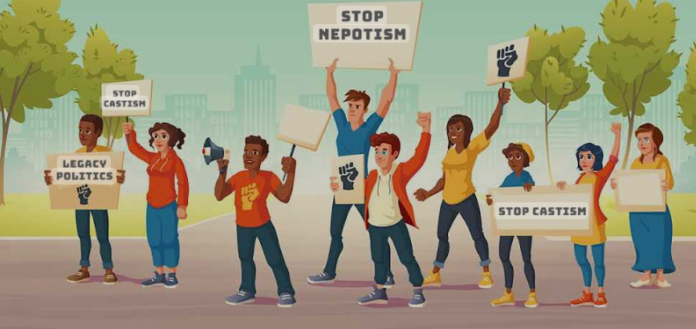Amit Pandey

Investigative journalists and political analysts have long criticized the prevalence of dynasty politics in India, arguing that it hinders the country’s progress and undermines the principles of democracy. One of the key issues associated with dynasty politics is the lack of meritocracy in leadership positions. Instead of selecting leaders based on their qualifications, experience, and abilities, these parties often prioritize family connections and lineage.
The roots of dynastic politics in India can be traced back to the pre-independence era when influential families played pivotal roles in the freedom struggle. However, it was the post-independence era that witnessed the proliferation of political dynasties, notably exemplified by the Nehru-Gandhi dynasty. Jawaharlal Nehru, India’s first Prime Minister, laid the foundation for a political legacy that continues to exert influence over Indian politics to this day. Subsequent generations of the Nehru-Gandhi family have held significant positions of power within the Indian National Congress, shaping the party’s trajectory and the nation’s political landscape.
Dynastic politics in India presents a paradoxical challenge to democratic ideals. While democracy ostensibly promotes equal opportunity and merit-based selection, political dynasties often perpetuate a culture of entitlement and privilege. Candidates from political families enjoy name recognition, access to resources, and party patronage, which can overshadow the potential of grassroots leaders and new entrants. This undermines the democratic principle of fair competition and limits the diversity of representation within political institutions.
Furthermore, the perpetuation of dynastic politics fosters a culture of sycophancy and nepotism within political parties. Loyalty to the family takes precedence over allegiance to party ideology or the interests of constituents. This undermines internal party democracy and stifles dissent, as party members fear reprisals for challenging the entrenched power structures.
The dominance of political dynasties poses significant challenges to effective governance. Inherited positions of power often result in leadership based on lineage rather than competence or vision. This can lead to a dearth of innovative policies and a reliance on outdated approaches to governance. Moreover, the concentration of power within a select few families can impede accountability and transparency, as dissenting voices are marginalized and critical scrutiny is stifled.
Furthermore, the perpetuation of dynastic politics can perpetuate a culture of entitlement among political elites, leading to a disconnect between elected representatives and the electorate. This breeds resentment and disillusionment among the populace, eroding trust in democratic institutions and fueling anti-establishment sentiments.
The detrimental effects of dynasty politics can be seen in the performance of these parties. Family members who inherit positions without merit often lack the necessary skills and knowledge to effectively govern and represent their constituents. As a result, these parties tend to prioritize personal gain and self-interest over public welfare. Governance becomes a means to accumulate wealth and power for their own families, rather than a service to the people.
Additionally, dynasty politics perpetuates a culture of entitlement and nepotism within these parties. Party members who are born into influential families often feel entitled to leadership positions and are less likely to face opposition or accountability from within the party. This stifles internal dissent and hampers the growth and development of new leaders with fresh ideas and perspectives.
The consequences of dynasty politics extend beyond the internal workings of political parties. The governance and development of various states in India have also been greatly affected. In states where family-dominated parties hold power, decision-making is often centralized and concentrated within the hands of a few individuals. This leads to a lack of inclusivity and diversity in policy formulation, as the opinions and concerns of ordinary citizens and marginalized groups are often ignored.
Moreover, the perpetual domination of family dynasties in politics robs aspiring and competent individuals from disadvantaged backgrounds of the opportunity to participate and contribute to the political process. This deprives India of potential leaders who could bring fresh ideas, innovative solutions, and genuine representation to the table.
The need for reform in dynasty politics is clear, but it is not an easy task. Breaking free from the curse of dynasty requires a multi-faceted approach involving political, societal, and judicial changes. It demands a shift in the mindset and values of political parties and their members, as well as a commitment to promoting inclusivity, meritocracy, and transparency.
One possible solution is the implementation of internal party democracy. This would involve empowering party members to elect their leaders through a transparent and fair process, reducing the influence of family lines and favouritism. Some political parties, such as the Aam Aadmi Party, have already adopted this approach with some success. By giving party members a say in the selection of leaders, parties can ensure that competent and deserving individuals rise to the top, rather than those with familial connections.
Additionally, efforts must be made to increase political awareness and empower voters to make informed choices. Civil society organizations, the media, and educational institutions play a crucial role in educating citizens about the drawbacks of dynasty politics and promoting the importance of selecting leaders based on merit and public mandate.
Furthermore, there is a need for legislative intervention to address the issue of political dynasties. Some countries, such as the Philippines, have implemented laws prohibiting relatives of current or former elected officials from running for public office. While such measures may face resistance and legal challenges in India, they could serve as a starting point for a broader conversation on regulating and limiting the influence of political dynasties.
However, the success of these efforts ultimately depends on the willingness and determination of the Indian voters to demand change. Voters must look beyond the charisma and popularity of political families and evaluate candidates based on their competence, integrity, and track record.
Ultimately, the curse of dynasty politics must be broken for India to truly fulfil its democratic potential. Only by promoting meritocracy, inclusivity, and accountability can India’s political landscape become a platform for genuine representation, progress, and development. It is time for Indian voters to demand a level playing field and reject the stranglehold of family dynasties on their nation’s politics.


